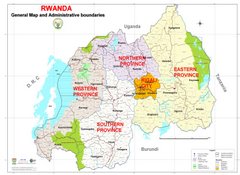Being a journalist in
Media has a role to educate, inform and entertain, but educating hatred in 1994 was the main objective of the RTLM (Radio Télévision Libre des Milles Collines), the one private station by 1993. So many newspapers were found in the 1990 – 1994 period they were allied to political parties; they couldn't play their role as media but only the role of propaganda.
Media had played a huge role in the genocide, as a tool of hate propaganda.
How can a journalist overcome the situation?
After approximately a million to be killed within a short time of 100 days: political leaders, journalists, scholars, children, every kind of persons women and men were touched by this.
Do the people still have the hope in the Medias?
The answer can be yes, with an orientation. The school of journalism and communication born in 1996 came to give a help to the Rwandan media.
The trust in media was threatened, professionals were very few and the need to inform was crucial. Private newsrooms came to reinforce the public ones but of course with so many challenges. Beginning by in 1995, different newspapers came into place but people still have the image of a hatred media of hatred. Even the government has the same picture of the press as in 1994.
The need to establish a watchdog of media was inevitable considering the power importance that the media has to the population. The high press council of the press and the press law were put in place by 2002. The idea was good but the execution is different. The problem that these two institutions have today is that they are accused by the beneficiaries; journalists personally don't see their rights respected in order to allow them to play fully and freely their role.
Journalists need to express their views without any interference, within the law governing the country. Freedom of expression cannot be separated into compartments.
Do the journalists know their rights? If so, do they know how to marry them with what they do to the field exercising their job? Some of journalists don't have enough packages benefits? Compared to their backgrounds, so many private media are being run by unprofessional persons. They woken up in one morning and began to write. According to the report by High council of press, only 10% of those who exercise practicise journalism and are trained. The rest benefited from seminars by the school of journalism and communication, Internews, High council of press and ministry of information. This is not enough to be a good practitioner of the media.
The need of creating a center for journalists in
The center will supplement the school of journalism and communication but my worry is how it is going to be conducted? The school itself has a shortage of teachers. How will the two institutions with an aim to shape good reporters, writers, media professionals within this situation will sustain and reach to its their objectives?
Graduates from the school of journalism prefer to be employed by the NGO's instead of working with media in the country. How can media improve when professionals don’t want to be used by these media houses?
The will to work for media is present but for some of the graduates argue that they can't work with an institution which hasn’t a clear picture of what journalist look like. The only one television station in the country can't cover national wide. More than 10 private radio stations operating in the country can't follow standards of a professional media. How can a trained journalist work for such media?
The challenge comes back to the professionals. Who else do you need to build and consolidate your career? It is upon you trained journalists to invade the field and show you are able to put into practice what you acquired from books, experience, peers and the school.

No comments:
Post a Comment